"Cherishing Little Steps - A Haven for Baby and Family Journeys"
How to Rejuvenate Aging Skin
As you look in the mirror, you may notice subtle changes in your skin that hint at the passing of time. But fear not, for there are effective ways to address these signs of aging and restore vitality to your complexion. By exploring the realms of hydration, sun protection, and antioxidant-rich skincare products, you can embark on a journey towards rejuvenating your skin and unveiling a more youthful appearance. But remember, the key lies in understanding the intricacies of aging skin and tailoring your approach to meet its unique needs.
Key Takeaways
- Use skincare with antioxidants to combat aging and repair skin damage.
- Incorporate retinoids to increase cell turnover and improve skin texture.
- Hydrate skin with serums and masks for a plump, radiant complexion.
- Protect skin from sun damage with daily SPF and protective clothing.
- Consider professional treatments like chemical peels and laser therapy for effective rejuvenation.
Understanding Aging Skin
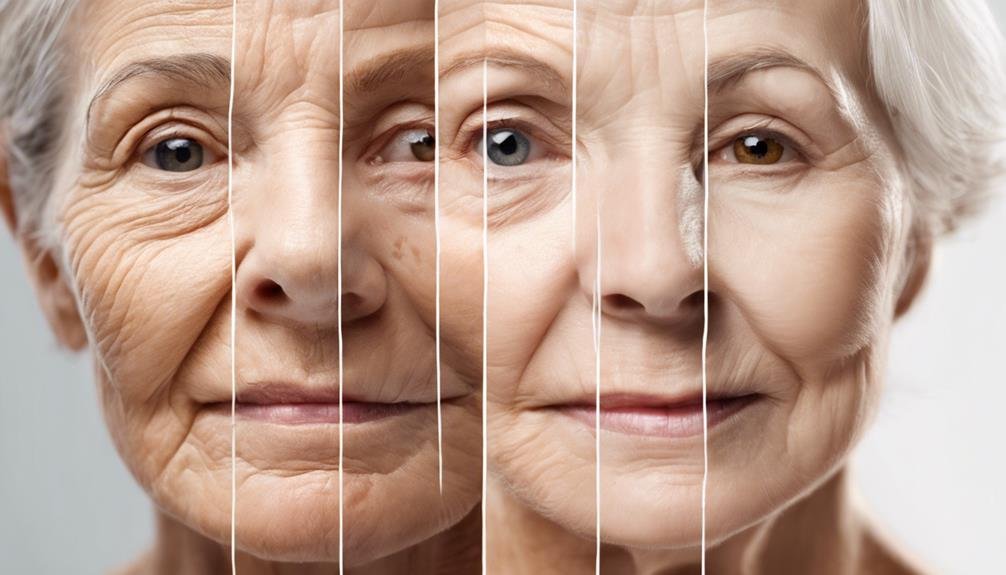
To understand aging skin, it's crucial to recognize the natural processes that occur as we grow older. As time passes, our skin undergoes various changes influenced by both intrinsic and extrinsic factors.
Intrinsic aging, also known as chronological aging, is inevitable and results from the passage of time. Collagen and elastin production decreases, leading to loss of skin elasticity and firmness. Additionally, cell turnover slows down, causing the skin to appear dull and rough.
Extrinsic factors such as sun exposure, smoking, and pollution also play a significant role in skin aging. Ultraviolet (UV) radiation damages collagen fibers and accelerates the formation of wrinkles and age spots. Smoking reduces blood flow to the skin, depriving it of oxygen and essential nutrients. Pollution exposes the skin to free radicals, contributing to premature aging.
Understanding these processes is fundamental in developing a comprehensive approach to rejuvenating aging skin. By addressing both intrinsic and extrinsic factors through proper skincare routines and lifestyle modifications, you can effectively combat the signs of aging and promote healthier, more youthful-looking skin.
Importance of Hydration
Hydration is a vital aspect of maintaining healthy and youthful skin. Your skin is the largest organ in your body and requires proper hydration to function optimally. When your skin is well-hydrated, it appears plump, radiant, and more resilient to environmental stressors. Dehydrated skin can lead to a dull complexion, fine lines, and wrinkles, making you appear older than you are.
To keep your skin hydrated, it's important to drink an adequate amount of water throughout the day. Additionally, using moisturizers that contain hydrating ingredients like hyaluronic acid, glycerin, and ceramides can help lock in moisture and improve your skin's overall hydration levels.
Furthermore, incorporating hydrating serums and face masks into your skincare routine can provide an extra boost of hydration for your skin.
Sun Protection Strategies

Maintaining proper sun protection strategies is key to preserving the health and appearance of your skin. Sun exposure is a major factor contributing to premature aging, wrinkles, and dark spots. To shield your skin from harmful UV rays, apply a broad-spectrum sunscreen with at least SPF 30 daily, even on cloudy days. Reapply every two hours, especially if you're swimming or sweating.
Wearing protective clothing like wide-brimmed hats and sunglasses is also essential. Seek shade during peak sun hours, typically between 10 a.m. and 4 p.m., when the sun's rays are strongest. Remember, sun damage accumulates over time, so consistent protection is crucial.
Additionally, avoid tanning beds, as they emit harmful UV radiation that accelerates skin aging. By integrating these sun protection practices into your daily routine, you can safeguard your skin from premature aging and maintain a youthful, radiant complexion.
Power of Antioxidants
When considering ways to enhance your skincare routine and combat the effects of aging, exploring the power of antioxidants is paramount. Antioxidants play a crucial role in protecting your skin from damage caused by free radicals, UV rays, and pollution. Here are four reasons why incorporating antioxidants into your skincare regimen can help rejuvenate aging skin:
- Neutralizing Free Radicals: Antioxidants like Vitamin C and E help neutralize free radicals that contribute to premature aging, fine lines, and wrinkles.
- Boosting Collagen Production: Antioxidants stimulate collagen production, enhancing skin elasticity and firmness for a more youthful appearance.
- Reducing Inflammation: Antioxidants have anti-inflammatory properties that can soothe irritated skin, reducing redness and promoting a clearer complexion.
- Repairing Skin Damage: Antioxidants aid in repairing damaged skin cells, promoting overall skin health and vitality.
Integrating antioxidant-rich products into your daily skincare routine can provide your skin with the necessary support to combat aging and maintain a youthful glow.
Benefits of Retinoids
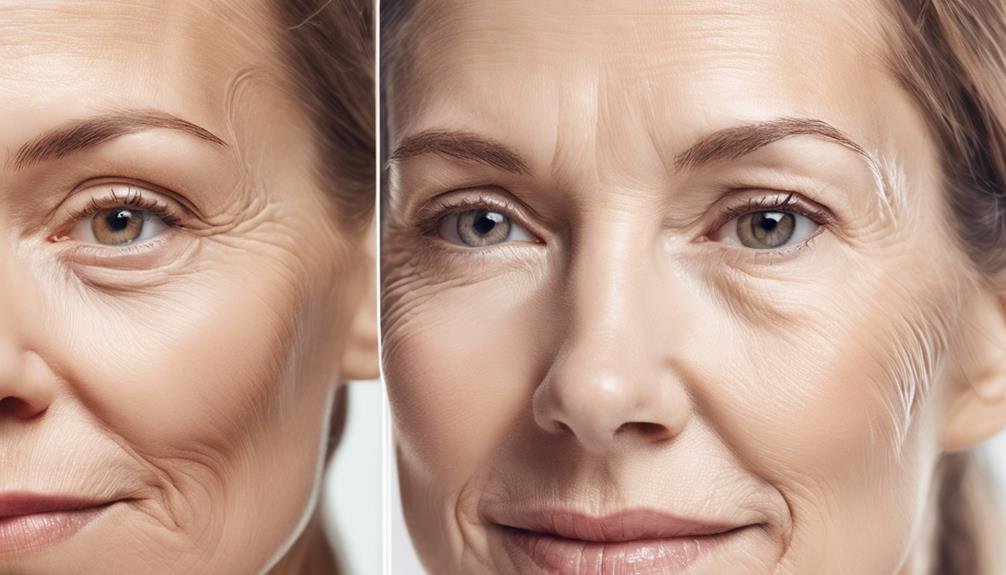
Enhancing your skincare regimen with retinoids can offer a multitude of benefits for rejuvenating aging skin. Retinoids, derived from Vitamin A, are known for their powerful anti-aging properties. These compounds work by increasing cell turnover, stimulating collagen production, and reducing the appearance of wrinkles and fine lines.
By promoting the shedding of dead skin cells and boosting the production of new skin cells, retinoids help to improve skin texture and tone, resulting in a more youthful and radiant complexion.
Moreover, retinoids are effective in treating sun damage, hyperpigmentation, and acne. They can help fade dark spots, even out skin tone, and unclog pores, leading to clearer and smoother skin. Additionally, retinoids have been shown to enhance the effectiveness of other skincare products when used together in a routine.
When incorporating retinoids into your skincare regimen, it's essential to start with a low concentration and gradually increase usage to prevent irritation. Consulting with a dermatologist can also help determine the most suitable retinoid product for your skin type and concerns.
Exfoliation Techniques
For effective rejuvenation of aging skin, understanding and implementing proper exfoliation techniques is crucial. Exfoliation helps remove dead skin cells, promote cell turnover, and reveal a brighter, smoother complexion. Here are some tips for effective exfoliation:
- Choose the Right Exfoliant: Opt for gentle exfoliants like chemical exfoliants (AHAs and BHAs) or mild physical exfoliants to avoid damaging the skin barrier.
- Exfoliate Regularly: Incorporate exfoliation into your skincare routine 1-3 times a week, depending on your skin type and the exfoliation method used.
- Be Gentle: Avoid harsh scrubbing and over-exfoliation, as this can lead to irritation and sensitivity.
- Moisturize After Exfoliation: Follow up with a hydrating moisturizer to replenish moisture and keep the skin barrier intact.
Hyaluronic Acid Benefits
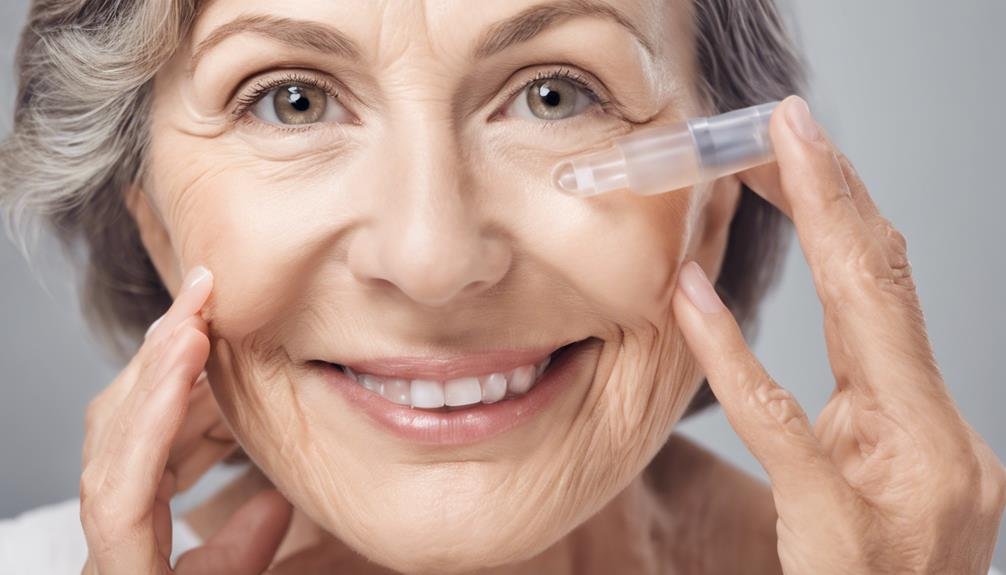
To further enhance the rejuvenation of aging skin, understanding the benefits of hyaluronic acid is key.
Hyaluronic acid is a naturally occurring substance in the skin that plays a crucial role in maintaining hydration and volume. As we age, the levels of hyaluronic acid in our skin decrease, leading to dryness, fine lines, and sagging.
By incorporating hyaluronic acid into your skincare routine, you can help replenish moisture, improve elasticity, and enhance the overall appearance of your skin.
One of the main benefits of hyaluronic acid is its ability to hold up to 1000 times its weight in water, making it a powerful hydrating agent. This helps to plump up the skin, reduce the appearance of wrinkles, and create a more youthful complexion.
Additionally, hyaluronic acid has anti-inflammatory properties that can help soothe and calm irritated skin.
Incorporating Peptides
Curious about how peptides can benefit your skincare routine? Peptides are short chains of amino acids that can work wonders for aging skin. Here's how to effectively incorporate peptides into your daily regimen:
- Boost Collagen Production: Peptides signal the skin to produce more collagen, a crucial protein for maintaining skin elasticity and firmness.
- Reduce Wrinkles: Peptides can help smooth out fine lines and wrinkles by promoting skin renewal and repair processes.
- Enhance Hydration: Some peptides have hydrating properties, helping to improve skin moisture levels and overall hydration.
- Fight Signs of Aging: By supporting skin structure and promoting cell regeneration, peptides can aid in combating various signs of aging like sagging skin and uneven texture.
When choosing skincare products containing peptides, look for formulations with a variety of peptides to target different skin concerns effectively. Incorporating peptides into your routine can lead to a more youthful and radiant complexion over time.
Essential Vitamin C
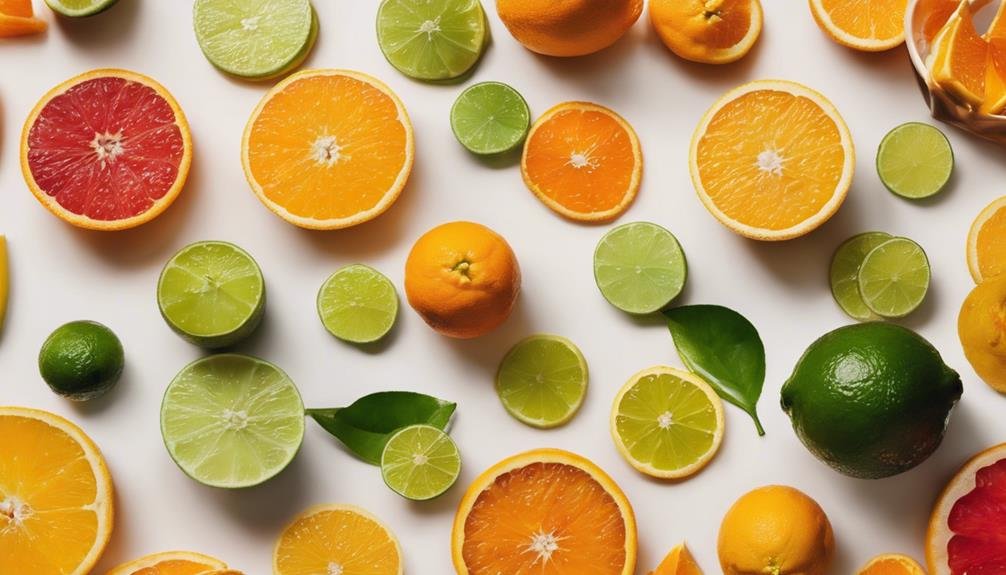
Peptides have undoubtedly shown promise in rejuvenating aging skin, but another essential ingredient making waves in the skincare world is Vitamin C. This powerhouse antioxidant is a must-have in your skincare routine due to its ability to brighten skin, fade dark spots, and boost collagen production.
Vitamin C works by neutralizing free radicals that can damage skin cells, leading to premature aging. By incorporating Vitamin C serums or creams into your daily regimen, you can help protect your skin from environmental stressors like UV radiation and pollution.
Additionally, Vitamin C can improve skin texture and reduce the appearance of fine lines and wrinkles, giving you a more youthful complexion. When choosing a Vitamin C product, opt for stable formulations that are stored in opaque or dark bottles to prevent oxidation.
With consistent use, Vitamin C can aid in rejuvenating your skin and promoting a healthy, glowing complexion.
Lifestyle Factors to Consider
Consideration of lifestyle factors is crucial when aiming to rejuvenate aging skin. Your everyday habits and choices play a significant role in the health and appearance of your skin.
Here are four key lifestyle factors to consider:
- Sun Protection: Protect your skin from harmful UV rays by wearing sunscreen daily, seeking shade, and wearing protective clothing. UV exposure accelerates skin aging, leading to wrinkles, age spots, and sagging skin.
- Healthy Diet: Consume a diet rich in fruits, vegetables, lean proteins, and healthy fats. Antioxidants and essential nutrients support skin health and combat oxidative stress, which contributes to premature aging.
- Hydration: Stay well-hydrated by drinking plenty of water throughout the day. Proper hydration helps maintain skin elasticity, plumpness, and overall health.
- Stress Management: Practice stress-reducing techniques such as meditation, yoga, or deep breathing exercises. Chronic stress can lead to inflammation and skin issues, so managing stress is essential for skin rejuvenation.
Professional Treatments
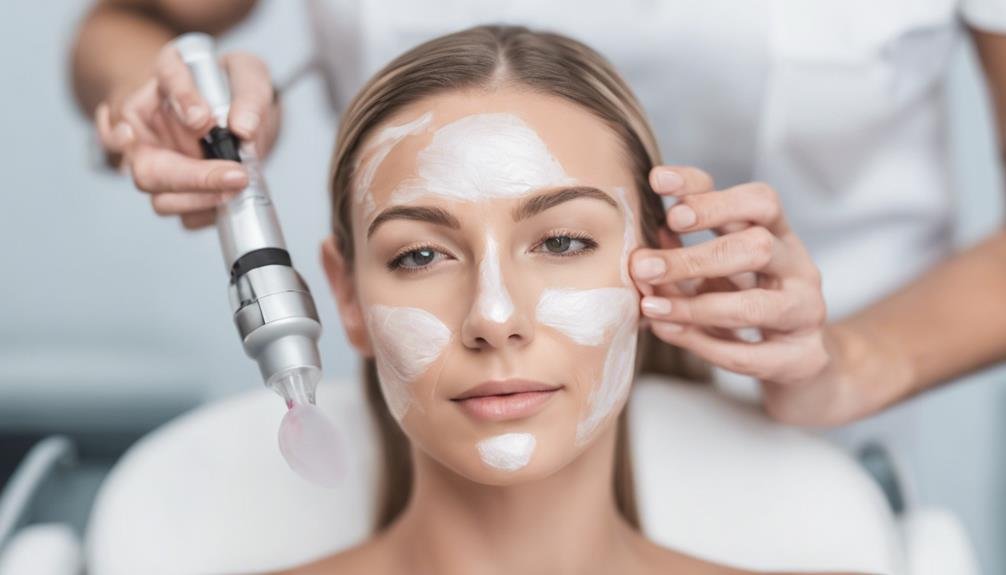
When seeking to rejuvenate aging skin, exploring professional treatments can significantly enhance your skincare regimen. Professional treatments offer advanced solutions that can target specific skin concerns effectively. Procedures like chemical peels, microdermabrasion, laser therapy, and dermal fillers are commonly used to address signs of aging such as wrinkles, fine lines, uneven skin tone, and loss of elasticity.
Chemical peels use acids to exfoliate the skin, revealing smoother and more youthful-looking skin. Microdermabrasion helps to remove dead skin cells and stimulate collagen production for improved skin texture. Laser therapy can target dark spots, redness, and wrinkles, promoting a more even complexion. Dermal fillers can restore lost volume, reduce the appearance of wrinkles, and enhance facial contours.
Before undergoing any professional treatment, it's crucial to consult with a qualified dermatologist or skincare professional to determine the most suitable option for your skin type and concerns. These treatments can yield remarkable results when incorporated into a comprehensive skincare routine.
Creating a Skincare Routine
Enhancing the health and appearance of your skin requires a well-thought-out skincare routine tailored to your specific needs. To create a skincare routine that effectively rejuvenates aging skin, follow these essential steps:
- Cleansing: Start and end your day with a gentle cleanser to remove impurities and excess oil without stripping your skin of its natural oils.
- Exfoliation: Regular exfoliation helps to slough off dead skin cells, promoting cell turnover and revealing fresher, younger-looking skin.
- Moisturizing: Hydration is key to plumping up fine lines and wrinkles. Choose a moisturizer rich in antioxidants and peptides to nourish your skin.
- Sun Protection: Shield your skin from harmful UV rays by applying a broad-spectrum sunscreen daily. Sun protection is crucial in preventing further skin damage and premature aging.
Frequently Asked Questions
Can Genetics Influence How Aging Skin Develops?
Genetics can significantly influence how aging skin develops. Factors like collagen production, elasticity, and skin thickness are all linked to genetic predispositions. Understanding your genetic makeup can provide insight into how your skin may age.
Is It Safe to Mix Different Skincare Ingredients?
Yes, it can be safe to mix skincare ingredients, but caution is necessary. Some combinations may cause irritation or decrease effectiveness. Research ingredient compatibility and start with small amounts. Consider consulting a dermatologist for personalized advice.
What Role Does Stress Play in Skin Aging?
Stress accelerates skin aging by triggering inflammation, collagen breakdown, and impaired skin barrier function. Your skin bears the weight of stress visibly, leading to wrinkles, dullness, and loss of elasticity faster. Managing stress is key for skin health.
Are There Specific Foods That Can Improve Skin Health?
Eating a balanced diet rich in fruits, vegetables, and healthy fats can improve skin health. Foods like berries, avocados, and nuts provide antioxidants and essential nutrients that support skin rejuvenation. Remember, what you eat impacts your skin's appearance.
How Does Pollution Impact the Aging Process of the Skin?
Pollution accelerates skin aging by generating free radicals that break down collagen and elastin. These pollutants can lead to wrinkles, dark spots, and dullness. Protect your skin by cleansing regularly and using antioxidants like vitamin C.
Conclusion
In conclusion, by focusing on hydration, sun protection, and incorporating antioxidants into your skincare routine, you can effectively rejuvenate aging skin. Like a painter delicately adding vibrant colors to a canvas, these strategies work together to restore moisture, protect against sun damage, and combat free radicals for a more youthful complexion. Keep up with a consistent skincare regimen and consider professional treatments to maintain healthy, radiant skin as you age.

